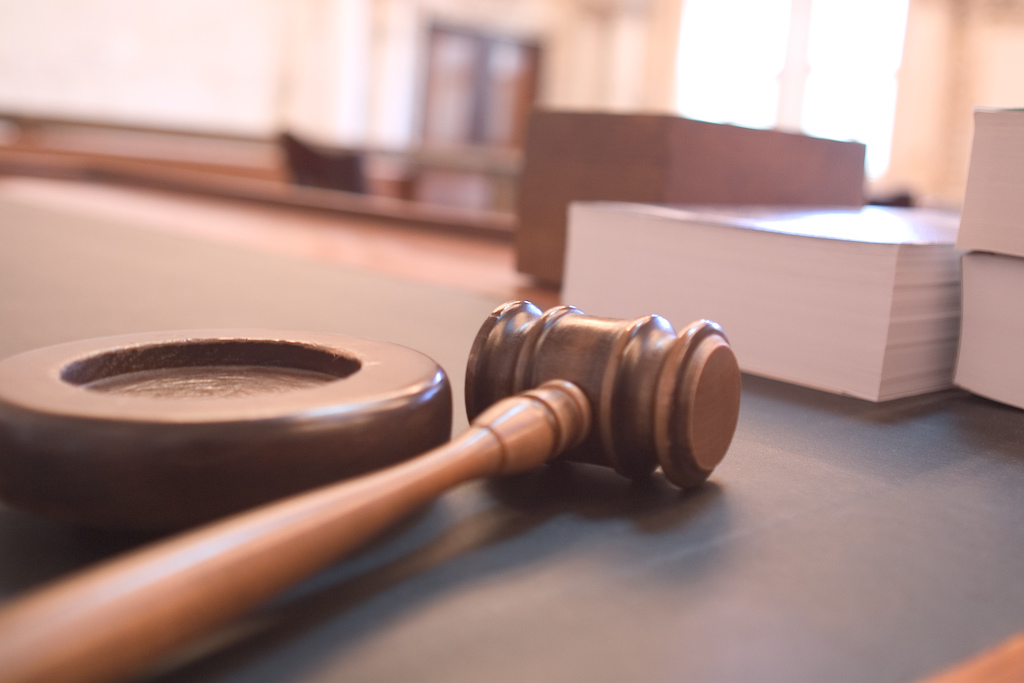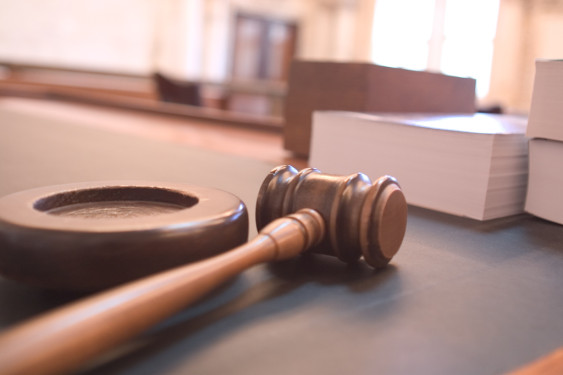Lawsuits can be especially useful to counter foot-dragging from our political institutions, forcing them to comply with the law—or even spurring action to improve existing legal protections.
Litigation has long played a critical role in the US environmental movement. Lawsuits can be especially useful to counter foot-dragging from our political institutions, forcing them to comply with the law—or even spurring action to improve existing legal protections.
So it’s not surprising that the courts have been at the center of a number of recent climate developments. After all, the current White House is overtly hostile to a clean energy future, as is a large segment of Congress. Meanwhile new studies and scientific findings reinforce the fact that bold measures are required if we are to preserve a habitable planet.
Which is where the lawyers come in. Here’s a sampling of the work they’ve been doing.
A New Date for the ‘Trial of the Century’
Despite persistent efforts by the government to derail a potentially groundbreaking climate lawsuit, the “youth plaintiffs” of Juliana v. U.S. are scheduled to get their day in court. In October, they will have the chance to argue in a federal district court in Oregon that the U.S. government’s decades-long encouragement of fossil-fuel extraction and consumption harms the “public trust” and violates the Constitution.
Plaintiffs maintain that by actively promoting fossil fuels, the federal government has ignored its responsibilities to protect our shared resources, such as tidelands and nearshore ocean waters as well as the atmosphere itself, held “in trust” for the benefit of the public. Doing so, according to the lawsuit, has also compromised the well-being of current and future generations despite constitutional guarantees of life, liberty, and property.
The government has worked vigorously to prevent the case from going to trial. Shortly after it was filed in 2015, government lawyers asked the court to dismiss the entire litigation. Not only did the judge refuse to do so, but in a 2016 ruling she validated key aspects of the plaintiffs’ case, most strikingly in the finding that “the right to a climate system capable of sustaining human life is fundamental to a free and ordered society” and is protected by the Bill of Rights. As all of the parties in the case recognize, this is a first: no court has ever found a similar right as part of the Constitution.
Faced with an original trial date of February 2018, the government took the unusual step of asking the Ninth Circuit Court of Appeals to step in and terminate the lawsuit. (Typically, parties must wait until the lawsuit has concluded in the district court before bringing an appeal.) In March, a panel of judges from the Ninth Circuit refused the government’s premature request, finding no urgent need to intervene. The court in Oregon was then free to set a new date of October 29 for the so-called “Trial of the Century” to begin.
Still, the government has not given up on the hope that it can avoid a public reckoning. Beginning in early May, it has filed a series of documents in the Oregon court that reveal an especially combative litigation strategy.
The government has made multiple requests to halt discovery, the process that allows the plaintiffs to question government officials and access documents related to their claims. The court denied one on May 25, and government lawyers promptly filed another shortly after that rejection.
In addition, the government filed two sets of arguments that again ask for the plaintiffs’ case to be dismissed, one of which revives a number of the same points that the court found unpersuasive in 2016. A hearing for the first of the two will take place on July 18.
When the Ninth Circuit agreed to allow the plaintiffs’ case to continue, it did caution that some of the plaintiffs’ claims “are quite broad” and noted the likelihood that they would be “vastly narrowed” over time. The government maintains that it is merely following the Ninth Circuit’s guidance. But it has chosen an approach that appears equally well-designed to harass the plaintiffs and clog the court’s schedule. In fact, its arguments are primarily aimed at eviscerating the case, rather than “narrowing” it, and the short-term goal may be to once again delay a looming trial date.
From its behavior, it is hard not to conclude that the federal government will do almost anything to avoid a direct confrontation in open court with Kesley Juliana and her fellow youth plaintiffs.
Lawsuits and More Lawsuits
Our Children’s Trust, the nonprofit that is leading the effort in Juliana, is also coordinating a larger fifty-state strategy.
Climate litigation has been filed in state courts around the country, and cases remain active in Alaska, Oregon, and Washington (among others). Instead of faulting the federal government’s policies (as in the Juliana case), these lawsuits ask the courts to find that individual states are obligated to undertake a more aggressive response to climate change.
To date, the organization’s climate litigation has had mixed results, including in Washington. In 2013, a Washington state court of appeals dismissed a lawsuit that argued that the state, based on a public trust theory, had an obligation to reduce greenhouse gas emissions in order to preserve our shared atmosphere.
As a result, the group’s next lawsuit took a more cautious approach, specifically challenging the Department of Ecology’s denial of a petition requesting regulations that would establish stricter limits on greenhouse gas emissions. Based in part on the Washington State Constitution and public trust protections for ocean waters included within it, a Superior Court judge found in 2015 that that the agency was required to address the emissions, although it concluded that Ecology’s efforts at the time were adequate.
The latest lawsuit, filed in February 2018, is expansive, more closely resembling the first effort. It charges multiple state agencies with operating an energy and transportation system that violates the rights of Washington residents, raising a broad public trust theory but also grounding its claims in the state constitution.
Why should the third time be the charm? This litigation may have a greater chance of success, building on the partial victory in 2015—that recognized the state’s climate responsibility—and the experience gained from the ongoing fifty-state strategy. Our Children’s Trust may also be interested in finally securing a definitive result from the state Supreme Court that would settle once and for all the question of Washington’s climate obligations.
The lawsuits originated by Our Children’s Trust, however, are not the only example creative climate lawyering.
Another trend to watch is the growing number of jurisdictions (primarily cities and counties) that are directly suing major oil and gas companies in courts across the country. The legal claims are not identical, but all include variations on the idea that the companies are at fault for continuing to promote fossil fuels in the face of overwhelming evidence of their destructive power.
Cases have been filed in California (around a half-dozen pending in the Golden State alone!), Colorado, and New York. And the list of participating jurisdictions recently added two more, with King County filing its own lawsuit this May and Rhode Island filing a case last week. These matters are all in their preliminary stages, but already the legal maneuvering has begun. Oil and gas defendants have been diligently working to move the California cases out of state courts and into the federal courts, where industry believes that it has stronger legal defenses.
In New York, the court recently held a hearing on the issue of whether to dismiss the lawsuit. Although the judge has not yet made a ruling, his pointed questioning of the lawyers representing New York City revealed a fair degree of skepticism.
In California, a judge had earlier gained attention for holding a courtroom “tutorial” on climate science, notable in part for what the oil company defendants did not do: deny climate change. On June 25, however, he dismissed the lawsuits brought by the cities of Oakland and San Francisco.
Although it requires wading through some legal doctrine to get there, the basis for the ruling is relatively straightforward. After repeatedly noting the critical role of fossil fuels in modern society, the judge found that addressing climate change is a matter for our political institutions, not the courts:
This order fully accepts the vast scientific consensus that the combustion of fossil fuels has materially increased atmospheric carbon dioxide levels, which in turn has increased the median temperature of the planet and accelerated sea level rise. But questions of how to appropriately balance these worldwide negatives against the worldwide positives of the energy itself, and of how to allocate the pluses and minuses among the nations of the world, demand the expertise of our environmental agencies, our diplomats, our Executive, and at least the Senate.
But as the judge is no doubt aware, it is the failure of the very institutions referenced in the decision that has brought us to this point.
And More to Come
This in no way represents the full scope of climate advocacy in the courts. Activists and lawyers routinely use lawsuits to challenge proposals that would further destabilize the climate, including in the fight against recent projects that would facilitate the transport of coal and oil through the Northwest. Groups are also frequently in court to halt attempts by the Trump Administration to roll back climate measures that were put in place under President Obama.
Over the next year, we will continue to hear more about the various lawsuits by climate plaintiffs, no doubt including some that have not yet been filed in court. You can check back here for updates on these cases, which could provide relief from the less inspiring climate news coming from the other Washington.










